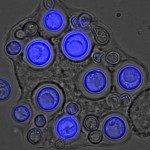Lien vers Pubmed [PMID] – 16449304
J. Antimicrob. Chemother. 2006 Mar;57(3):384-410
Candida spp. are responsible for most of the fungal infections in humans. Available since 1990, fluconazole is well established as a leading drug in the setting of prevention and treatment of mucosal and invasive candidiasis. Fluconazole displays predictable pharmacokinetics and an excellent tolerance profile in all groups, including the elderly and children. Fluconazole is a fungistatic drug against yeasts and lacks activity against moulds. Candida krusei is intrinsically resistant to fluconazole, and other species, notably Candida glabrata, often manifest reduced susceptibility. Emergence of azole-resistant strains as well as discovery of new antifungal drugs (new triazoles and echinocandins) have raised important questions about its use as a first line drug. The aim of this review is to summarize the main available data on the position of fluconazole in the prophylaxis or curative treatment of invasive Candida spp. infections. Fluconazole is still a major drug for antifungal prophylaxis in the setting of transplantation (solid organ and bone marrow), intensive care unit, and in neutropenic patients. Prophylactic fluconazole still has a place in HIV-positive patients in viro-immunological failure with recurrent mucosal candidiasis. Fluconazole can be used in adult neutropenic patients with systemic candidiasis, as long as the species identified is a priori susceptible. Among non-neutropenic patients with candidaemia fluconazole is one of the first line drugs for susceptible species. Cases reports and uncontrolled studies have also reported its efficacy in the setting of osteoarthritis, endophthalmitis, meningitis, endocarditis and peritonitis caused by Candida spp. among immunocompetent adults. In paediatrics, fluconazole is a well tolerated and major prophylactic drug for high-risk neonates, as well as an alternative treatment for neonatal candidiasis. Importantly 15 years after its introduction in the antifungal armamentarium, fluconazole is still a first line treatment option in several cases of invasive candidiasis. Its prophylactic use should however be limited to selected high-risk patients to limit the risk of emergence of azole-resistant strains.

